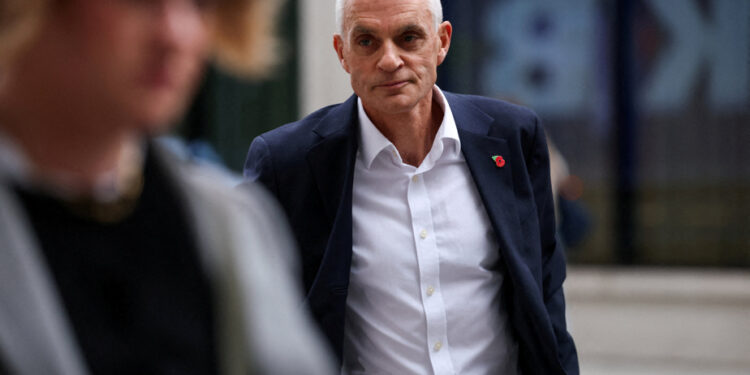(London) The resigning director general of the BBC Tim Davie on Tuesday called on the group to “fight” to defend its journalism, after Donald Trump’s threats of defamation proceedings against the British public broadcasting group for a misleading montage of one of his speeches.
“We must fight to defend our journalism”, “we are a unique and valuable organization, and I see the freedom of the press being put to the test,” said Tim Davie, who spoke for the first time to BBC employees since announcing his resignation on Sunday due to the controversy.
He also admitted “a breach of our editorial rules” to employees.
Lawyers for the US president – who on Sunday called BBC journalists “corrupt” and “dishonest” on his Truth Social network – have given the group until 5 p.m. ET on Friday to remove the documentary including the misleading montage broadcast in October 2024 and apologize.
Failing this, they will seek no less than a billion dollars in damages in court, according to the letter they sent to the BBC.
The audiovisual group, a real institution in the United Kingdom, but shaken in recent years by several controversies, indicated that it would “examine” this letter and “respond directly to it in due time”.
Culture Minister Lisa Nandy is due to speak to MPs on Tuesday afternoon.
The chairman of the BBC board, Samir Shah, apologized to the BBC on Monday and acknowledged “an error of judgment”, without explicitly addressing Donald Trump.
The affair has already cost chief executive Tim Davie and BBC News boss Deborah Turness their jobs.
PHOTO HENRY NICHOLLS, AGENCE FRANCE-PRESSE ARCHIVES
BBC News boss Deborah Turness has resigned
Besides the BBC, the controversy is embarrassing for Keir Starmer’s Labor government, which prides itself on having established good relations with the Trump administration.
The Prime Minister defended the BBC on Monday, emphasizing its “vital role in an era of disinformation”, nevertheless calling on the institution to “maintain high quality”.
However, its spokesperson on Tuesday refused to comment on possible legal action. “It is up to the BBC to respond on editorial matters, and we have a close relationship with the United States on our shared priorities,” he said.
“Attacks” from the right
The affair also reignited the debate on the financing of the BBC, which derives most of its income from the license fee, and revealed the growing tensions within the BBC board of directors, partly appointed by the government.
Some on the conservative right accuse news programs of being biased on topics like the war in Gaza, transgender rights and Donald Trump.
Journalist Nick Robinson, flagship presenter of BBC 4 radio, lamented on Accusations of bias rejected by several BBC executives.
Former BBC chairman Richard Tait said the BBC was under “relentless attack” from the Conservatives and the far-right Reform UK party, which had “contributed to undermining public trust”.
Conservative MP for culture Nigel Huddleston again judged on Times Radio on Tuesday that the treatment of news at the BBC had “real problems, and in particular does not respect its duty of impartiality”.
He called on Keir Starmer to speak to the US president to avoid legal action.
Donald Trump has increased threats and lawsuits against the American media, but proceedings against the BBC would be difficult to defend in court, according to several experts.
The US president plans to open proceedings in Florida, where he lives, as the deadline of one year after the alleged offense to file a defamation complaint in the United Kingdom has passed.
American law is more protective of freedom of expression, and the BBC has only a “very small audience” in the United States, lawyer specializing in media law Matthew Gill told AFP.
On the other hand, it allows you to claim much greater damages.



